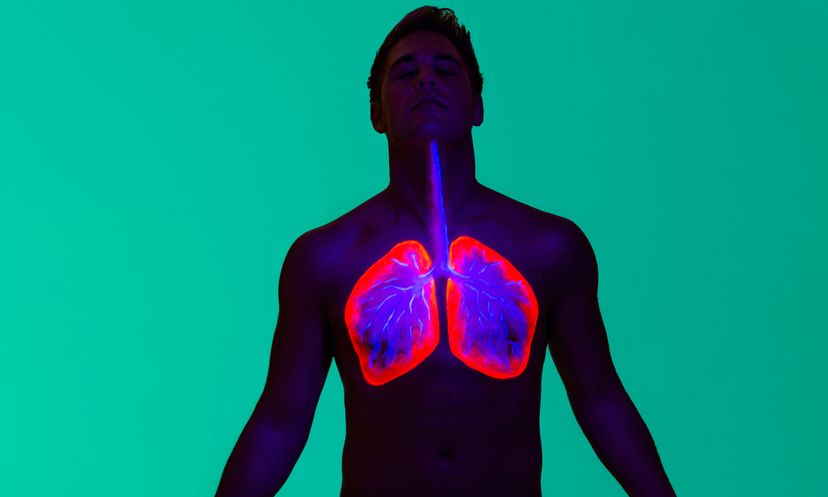
About This Quiz
Made up of airways, lungs, muscles, and blood vessels, your respiratory system is the mechanism that lets you breathe. How much do you know about the respiratory system?The epiglottis is a thin flap of skin that covers your windpipe when you swallow, preventing food and drink from entering your lungs. This is a good thing.
Ancient Egyptians created a hieroglyph showing lungs attached to a windpipe, to symbolize the unity between upper and lower Egypt.
A dome-shaped muscle right below your lungs, the diaphragm separates your chest cavity from your abdominal cavity. It is the main muscle you use to breathe.
Advertisement
Your left lung is actually smaller than your right lung, to allow room for your heart — even if, like the Grinch, your heart is two sizes too small. Actually, if that's true, you should seek medical help.
You exhale 17.5 milliliters of water simply from breathing regularly. When exercising, you lose four times that number. So don't forget to hydrate!
Cilia, small hairs found in your nose and airways, move in a sweeping motion to keep out particles and keep your air passages clean. However, continued exposure to harmful substances such as cigarette smoke will break the cilia down and leave you vulnerable to health problems like bronchitis.
Advertisement
Although today we know that asthma is a chronic lung disease, only a few decades ago asthma treatments focused mostly on psychoanalysis. Some therapists even believed a child's asthmatic wheezing was actually a suppressed cry for his or her mother. Fortunately, modern medicine has finally caught up.
A horse can only breathe through its nostrils, not its mouth. Horses have a flap of tissue that forms a tight seal over the oral cavity which only moves when they eat or drink. Then, the flap closes off the nasal cavity.
Alveoli are tiny, balloon-like air sacs at the end of your bronchioles, which are at the end of your bronchial tubes. Oxygen passes through alveoli and passes into the blood. This requires over 300 million alveoli.
Advertisement
You breathe in between 2,000 and 2,400 gallons of air a day, the amount needed to oxygenate the 2,400 gallons of blood you pump through you heart each day.
Bronchitis is an infection in your bronchial tubes. This infection occurs when the cilia lining your upper airways don't trap all the germs you breathe in. Bronchitis can cause a buildup of mucus, narrowing your airways and making it difficult to breathe.
As you breathe, your respiratory system carries oxygen to the cells in your body. Your cells ute the oxygen and create the waste product carbon dioxide. The capillaries bring the carbon dioxide back to your lungs, where you rid your body of it by exhaling.
Advertisement
The alveoli are tiny balloon-like sacs in your lungs. They fill with air when you inhale, making your lungs the only organs in the body that can float on water.
Your lungs have five lobes. The right lung has three lobes -- the superior, middle and inferior. The left has two -- superior and inferior.
Tuberculosis (TB), a bacterial infection that attacks the lungs and other parts of the body, can be fatal if not treated correctly. TB is a contagious disease, as it transmits through air. If you are exposed to TB, you should get medical attention immediately.
Advertisement
Asthma is a chronic disease of the airways. With asthma, inflammation cause airways to narrow, resulting in shortness of breath, wheezing, coughing, and tightness in the chest. Severe asthma can cause inability to speak or decreased activity, as well as emergency room visits. Asthma affects about 26 million people in the United States.
COPD (chronic obstructive pulmonary disease) is a progressive disease resulting from damage of the airways and airsacs, usually from cigarette smoking and other pollutants. COPD prevents easy airflow in and out of your lungs.
Your brain is the biggest user of oxygen in the body. It's the first to notice any change in concentrations, and the first organ to suffer from a shortage of oxygen.
Advertisement
Lung cancer is the world's most prevalent cancer, with 1.4 million people diagnosed each year. Many cases of lung cancer are due to smoking and other lung pollutants.
Produced by cells in the trachea and bronchial tubes, mucus keeps your air passages moist. It also stops irritants like dust, bacteria, allergens and other substances from entering the lungs. Irritants that do enter the lungs can be coughed up via mucus.